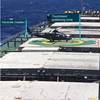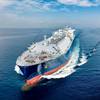Fitch Warns: Shippers' Costs and Capex may Increase
More stringent fuel regulations regarding sulphur content could significantly increase global shipping companies' operating costs and capex needs, says Fitch Ratings in a new report.
"This may negatively affect their credit quality unless they manage to pass these costs to customers. Many shipping companies have started implementing fuel surcharges to recover costs associated with the new sulphur cap regulation, but their ability to sustain these will depend on market fundamentals, which remain challenging," said Flitch.
Competitive dynamics may change in the longer term with companies that are less financially able to absorb additional costs, especially given higher oil prices, withdrawing from the market. Reduced competitive pressures could then support a better supply-demand balance and allow the remaining shipping companies to raise freight rates in a bid to recoup some of the extra costs. The change in shipping fuel consumption could also affect refineries.
International Maritime Organization rules requiring ships to use fuel with sulphur content no higher than 0.5% (compared with 3.5% currently) come into effect on 1 January 2020. This means that shipping companies need to switch to higher-quality and more expensive marine fuel, use special equipment ("scrubbers") to reduce sulphur emissions or switch to alternative fuels, such as liquefied natural gas (LNG). The new regulation will apply globally. Sulphur Emission Control Areas were established in a limited number of sea areas in 2005 and the sulphur content limit for fuel in those areas was tightened to 0.1% in 2015.
The global shipping industry fuel cost bill could increase by up to USD60 billion a year as a result of the new rules from 2020 for a total merchant fleet of 60,000 vessels, according to Wood Mackenzie. According to Maersk Line, its additional fuel costs would be over USD2 billion with a cost for the container shipping industry as a whole of up to USD15 billion, based on the difference in price of fuel with 3.5% and 0.5% sulphur content.
Scrubbers could be a viable alternative for some companies, but require several million dollars in upfront investments for each ship. Furthermore, scrubbers' manufacturing and installing capacity is limited to fitting only about 2,000 scrubbers by 2020, according to Nordic bank SEB. The LNG option will also require investments to retrofit ship engines and capacity to carry high-volume LNG tanks. In addition, LNG refuelling infrastructure may not be readily available globally.
The impact of the new regulation is unlikely to be uniform across segments. Ship owners that lease out ships with fuel costs borne by the charterer will be significantly less affected than operators that cover the fuel bill themselves if fuel surcharges related to the sulphur cap are not sustained.
If a significant proportion of shipping companies opt for higher-quality, low-sulphur fuel to comply with the regulations, the balance in the oil products market, and therefore refineries, may be affected. The 4 million barrel a day marine fuel market has been absorbing residue from the refining process, so there may be a need for refineries to adjust processes if demand for heavy fuel drops.
Demand for higher-quality fuel could lead to higher prices and widen pricing differentials between low- and high-sulphur products. Refineries with a higher share of middle distillates in their output, which are required to produce low-sulphur marine fuel, will benefit from the change. Low-complexity refineries will be hit and may need to invest in upgrades to shift their output towards middle distillates.










